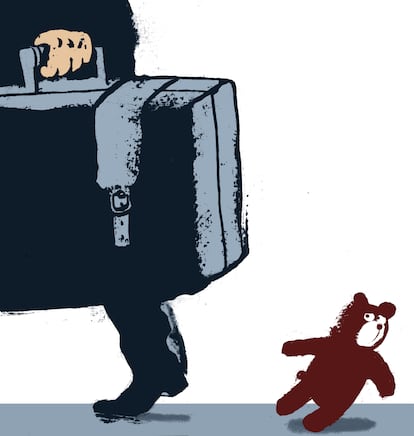An illustration of a man going on a trip.
Sitting on a stone, cigarette in hand, in front of the hotel in the German city of Stuttgart where I am staying for one night, I see them parade.
I wouldn't say they look bad, although their faces show seriousness, perhaps weariness.
They don't look like bums.
They are of different ages, younger and older, even boys and girls.
But in them I discover a strange regularity: each of them carries two suitcases.
Some also carry a backpack from which they can hang an object.
A teddy bear, for example.
It is the regularity of the two suitcases and the number of them that is going through (twenty, twenty-five) that puts me on alert.
They are not a caravan of tourists boarding a bus, or pilgrims executing a voluntary march.
And although I do not ask them, I conclude that they are a couple of tens of the millions of Ukrainian refugees they have had, who have been able to escape the horror of war and death.
Where are you going now with your two suitcases?
I can't tell where they're going, but I can imagine what they're carrying in their bags and what they've left behind.
In the place where they lived until a few weeks ago, they have had to abandon their entire life story, built up over the years.
In the suitcases they carry everything they have, while looking for a new place in the world, for a while or forever.
History repeats itself.
It can always be repeated… With two suitcases, exactly two suitcases, millions of German Jews left about eighty years ago who managed to escape from the horror that was upon them.
Some may have passed through this same sidewalk in Stuttgart.
The National Socialist authorities, when they were finally given a safe-conduct that allowed them to leave what had been their place of residence on earth for centuries, only allowed them to travel with two suitcases.
The rest of their belongings were left behind, like the life and history they had lived.
Also with only two suitcases, I saw some of my uncles and acquaintances leave, about fifty years ago, who emigrated from Cuba to the United States or Spain.
In those two suitcases, the only ones they were allowed to take off the island, they had to condense the meager possessions with which they were authorized to travel.
The rest of their belongings and memories remained in their houses, the existence they had lived until then.
The drama of forced exile, of the search for another place in the world, of fleeing from fear and repression, of poverty and hunger or the most brutal terror is repeated over and over again.
It was repeated yesterday with the Syrian refugees (to whom, by the way, few gave a very cordial welcome) and it is lived today with the Ukrainians who flee from the mortars, bombs and bullets (such as those used in wars) fired or launched in the course of the alleged Russian "special operation" ordered by Vladimir Putin.
The flight is repeated every day, in countless numbers, with migrants from the south who seek the north, through the Mediterranean, through the Rio Grande, wherever possible, wherever there is hope for the future, at least to preserve life.
In one of his books, Milan Kundera says that nobody leaves the place where they are happy.
Just that there are different ways to go.
The one practiced today by those Ukrainians that I have seen passing in front of my comfortable hotel in Stuttgart, dragging their entire lives in two suitcases, is as infamous as so many other escapes practiced throughout history.
And the most encouraging thing (if it were possible to use the word) is that to those refugees that I have seen pass in front of me there are States, institutions, private people who offer them a hand.
The saddest thing is that, in current geopolitics, these human beings are hardly numbers: the reason for their misfortune lies in being tokens of a macabre power game that insists on raffling off world domination (or at least a part, among bigger, better), with everything inside it, including human beings.
Powers for which wars will always be possible contingencies on the board of their desires.
Even if it involves people who must escape with just two suitcases.
Subscribe here to the EL PAÍS América newsletter and receive all the key information on current affairs in the region
Leonardo Padura (Havana, 66 years old) is a Cuban writer, Princess of Asturias Award 2015. His books include
The Man Who Loved Dogs
and the series of novels by detective Mario Conde.
Exclusive content for subscribers
read without limits
subscribe
I'm already a subscriber

